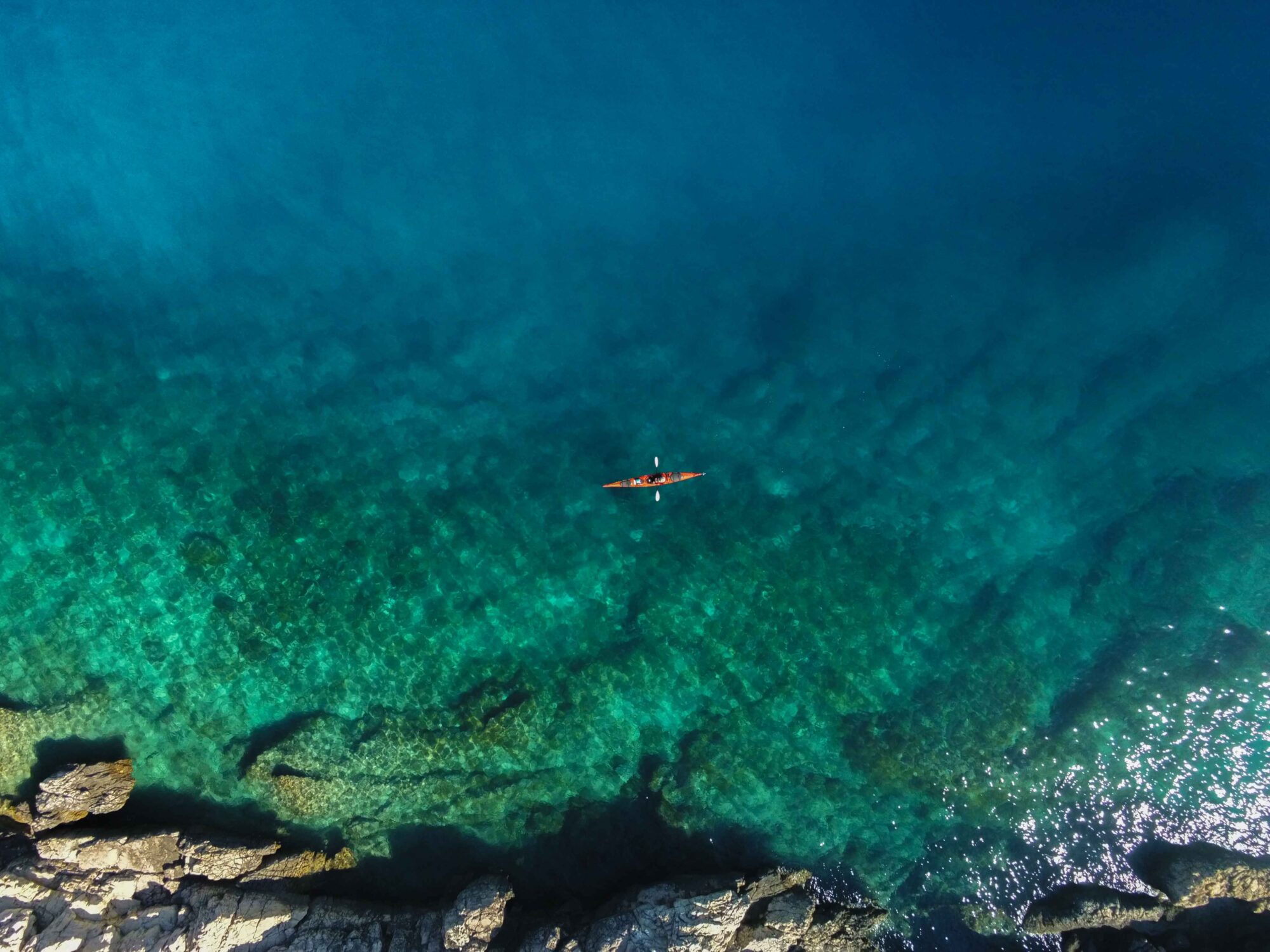Is sea kayaking good for your health? Let’s take a look at the physical, mental and cognitive benefits of kayaking.
In the realm of adventure sports, few activities offer the unique blend of physical challenge and mental serenity like sea kayaking does.
Gliding through calm waters or navigating through crashing waves, sea kayaking is more than just a thrilling outdoor pursuit. It’s also a highly effective way to improve your overall health and well-being. From building strength and endurance to reducing stress and improving mental clarity, the health benefits of sea kayaking are well known amongst practitioners.
Whether you’re an experienced paddler or a curious beginner, there’s no better time to discover how this activity can enhance your life.
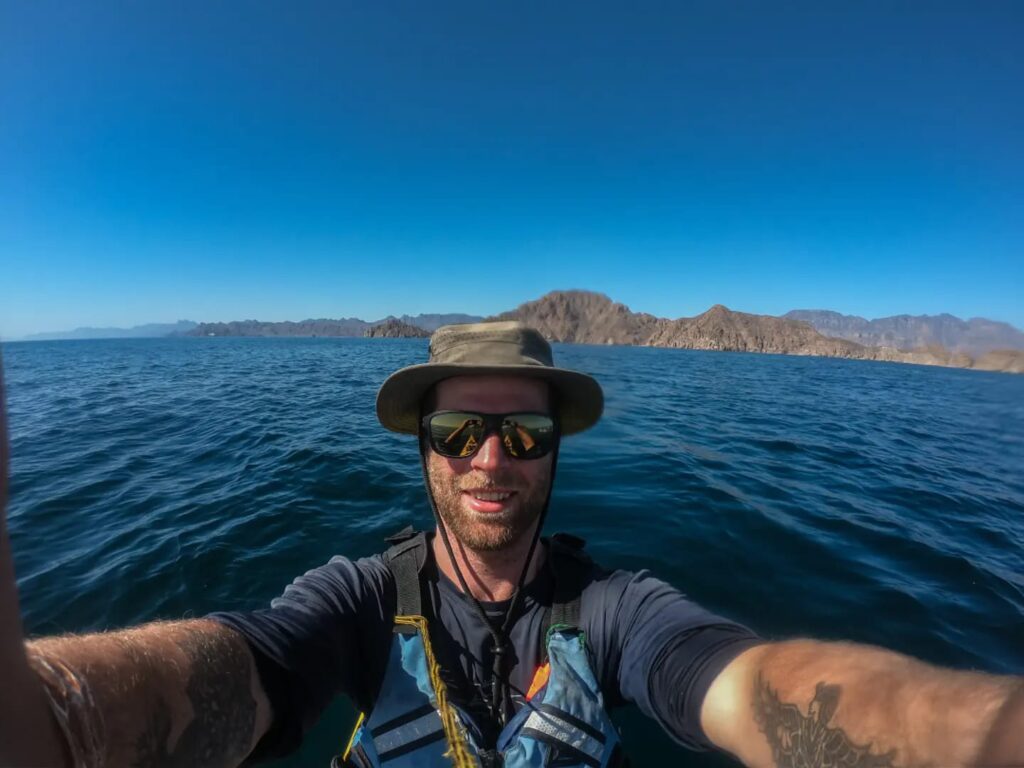
Physical Fitness Benefits of Kayaking
One of my first ever jobs in the Outdoor Industry was working as a canoe guide in France. We would facilitate 2 day canoe trips down the river for school students. At the end of the first day we would need to lug all the food, camping and cooking equipment for upwards of 100 people from the river to the campsite.
My boss told us, “You could moan about doing this every day, or, you can see this as your gym. This is your chance to get a workout it. Find a way to enjoy it and reap the benefits.”
And he was right. From that moment on, I’ve never shied away from physically intensive tasks at work.
But not every paddle journey ends with manual labour, so here’s how sea kayaking is a full-body workout that engages multiple muscle groups, promotes cardiovascular health, and improves overall fitness levels:
1. Core Strength and Stability
One of the most significant physical benefits of sea kayaking is the development of core strength. The paddling motion requires the engagement of your abdominal muscles, obliques, and lower back to keep balance and propel the kayak forwards. Each stroke involves a rotation of the torso, which continuously works the core muscles. Over time, this repeated twisting motion can lead to a stronger, more stable core, which is essential for maintaining good posture and preventing injuries in everyday life.
2. Upper Body Strength
Sea kayaking is particularly effective for building upper body strength. The act of paddling targets the muscles in your shoulders, arms, and upper back. With each stroke, you engage your deltoids, biceps, triceps, and lats. As you navigate through the water, your muscles are constantly working to push the paddle through the water and lift it back up, creating a highly effective resistance workout. Regular kayaking can lead to noticeable improvements in muscle tone and strength, especially in the arms and shoulders.
3. Lower Body Engagement
While it may not seem obvious at first, sea kayaking also involves significant lower body engagement. Your legs and hips play a crucial role in stabilizing the kayak and maintaining balance. Paddlers use their legs to press against the foot pegs, as well as their knees into the sides, which helps transfer power from the core to the paddle. This activation of the lower body contributes to overall strength and stability, particularly in the hips and thighs.
4. Cardiovascular Health
Sea kayaking is an excellent cardiovascular workout, especially when done at a moderate to high intensity. The continuous paddling motion gets your heart rate up, improving blood circulation and enhancing cardiovascular endurance. Regular kayaking can help lower blood pressure, reduce the risk of heart disease, and improve overall cardiovascular health. The aerobic nature of the activity also aids in burning calories, making it an effective way to manage weight and maintain a healthy lifestyle.
5. Improved Endurance and Stamina
Building endurance and stamina is another significant benefit of sea kayaking. Paddling for extended periods requires sustained effort, which gradually improves your body’s ability to perform prolonged physical activities. Over time, regular kayaking sessions can enhance your endurance, allowing you to paddle longer distances without feeling fatigued. This increased stamina can translate to better performance in other sports and activities, as well as improved energy levels in daily life.
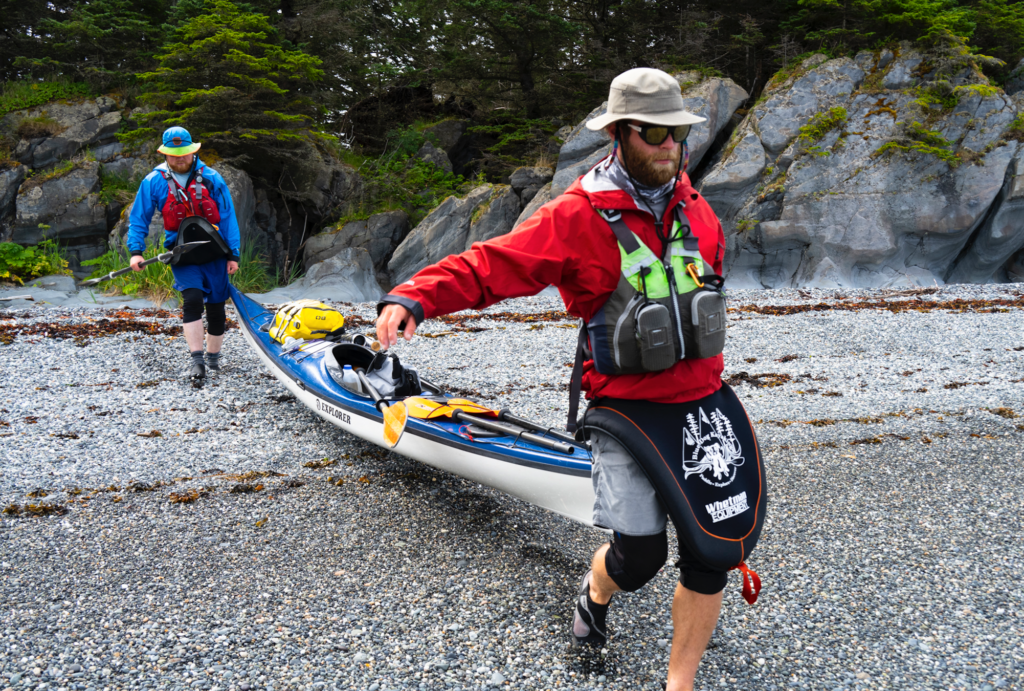
Mental Health Benefits of Kayaking
One of the comments I hear the most from my guests during kayak trips, is just how peaceful it is.
It’s truly an escape from the hustle and bustle of day to day life. Oftentimes I’ll tell the group to take a 5 minute moment of silence, as a chance to really lean into the moment.
The combination of physical activity, natural surroundings, and the rhythmic motion of paddling creates a powerful environment for mental well-being.
1. Stress Reduction
One of the most immediate and noticeable benefits of sea kayaking is its ability to reduce stress. The calming effect of being on the water, surrounded by nature, can have a profound impact on your mental state.
The gentle sound of the water, the rhythmic motion of paddling, and the serene environment all contribute to lowering stress levels. Studies have shown that spending time in nature and engaging in physical activity can significantly reduce cortisol levels, the hormone associated with stress.
Whether you’re paddling through tranquil coastal waters or navigating a scenic river, kayaking offers a peaceful escape from the pressures of everyday life.
2. Mindfulness and Mental Clarity
Sea kayaking naturally encourages mindfulness, the practice of being fully present and engaged in the moment.
As you paddle, you become acutely aware of your surroundings – the sound of the water, the movement of the kayak, the feel of the paddle in your hands. This focus on the present moment can help clear your mind of distractions and worries, promoting mental clarity and reducing anxiety.
The repetitive nature of paddling also has a meditative effect, allowing you to enter a state of flow where your mind is calm and focused. Many kayakers find that this sense of mindfulness extends beyond their time on the water, helping them approach daily challenges with a clearer and more balanced mindset.
3. Improved Mood and Mental Well-Being
Regular physical activity, such as sea kayaking, has been shown to have a positive impact on mood and mental well-being.
Exercise stimulates the release of endorphins, the body’s natural “feel-good” hormones, which can lead to an improved mood and a sense of happiness. Additionally, the exposure to natural light and fresh air that comes with kayaking can help boost serotonin levels, further enhancing mood and combatting feelings of depression.
Many kayakers report feeling a sense of euphoria and relaxation after a day on the water, making it an ideal activity for improving overall mental health.
4. Connection with Nature
In today’s fast-paced, technology-driven world, many people feel disconnected from nature. Sea kayaking offers a unique opportunity to reconnect with the natural world. Paddling through pristine waters, observing wildlife, and experiencing the beauty of the natural environment can have a grounding effect, fostering a deep sense of connection and appreciation for the world around you. This connection with nature has been linked to numerous mental health benefits, including reduced anxiety, increased happiness, and a greater sense of purpose and fulfillment.
5. Social Interaction and Community
While sea kayaking can be a solitary pursuit, it is also a social activity that can foster strong connections with others. Joining a kayaking club or participating in group paddling events allows you to meet like-minded individuals who share your passion for the sport. The camaraderie and sense of community that come with kayaking can be incredibly rewarding, providing social support, motivation, and opportunities for lasting friendships. Positive social interactions are crucial for mental health, contributing to feelings of belonging, self-esteem, and overall happiness.
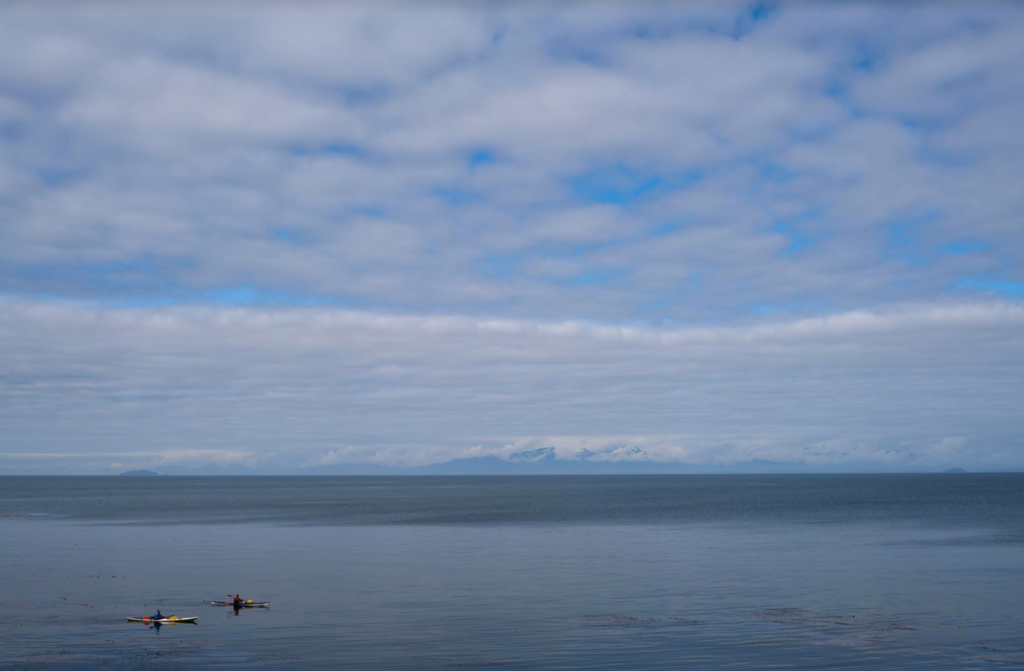
Cognitive Benefits of Kayaking
In addition to the physical and mental health benefits, sea kayaking can also have a positive impact on cognitive function. The combination of physical exercise, mental focus, and exposure to nature provides a holistic approach to brain health.
Just imagine you’ve spent all day focusing on the horizon looking for a blow of a humpback whale – that takes a lot of mental energy!
1. Enhanced Focus and Concentration
Sea kayaking requires a high level of focus and concentration. Whether you’re navigating through challenging waters, coordinating your paddling strokes, or observing your surroundings, kayaking demands that you stay mentally engaged. This continuous mental effort can help improve cognitive function, particularly in areas related to focus, attention, and decision-making. Over time, regular kayaking can lead to better concentration and mental acuity, both on and off the water.
2. Problem-Solving Skills
Kayaking often involves navigating through complex and changing environments, which can challenge your problem-solving abilities. You may need to adjust your route due to changing tides, avoid obstacles in the water, or find the most efficient way to paddle against a strong current. These situations require quick thinking and adaptive problem-solving, skills that are transferable to many aspects of life. The more you kayak, the more you develop the ability to assess situations, make decisions, and find solutions under pressure.
We call it a ‘dynamic risk assessment’.
3. Memory Retention
Spending time in nature has been shown to improve memory retention and cognitive function. The combination of physical exercise and natural environments can enhance the brain’s ability to store and recall information. Whether you’re memorizing navigation routes, recalling paddling techniques, or simply remembering the sights and sounds of your adventure, sea kayaking can help keep your mind sharp and your memory strong.
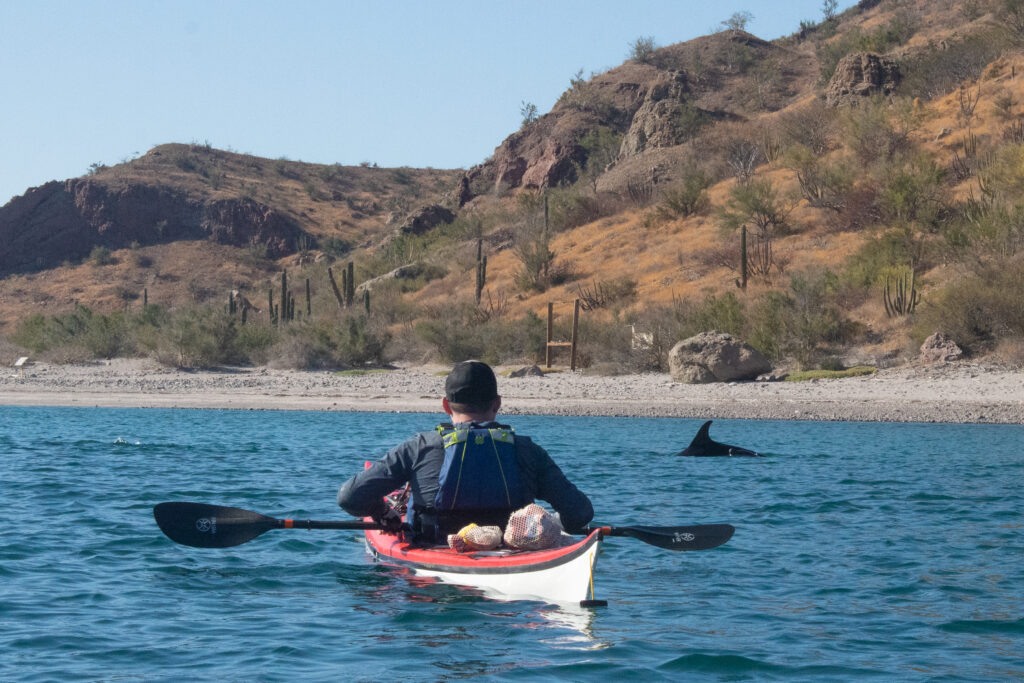
Environmental and Social Benefits
The benefits of sea kayaking extend beyond personal health, impacting both the environment and society as a whole. As more people embrace kayaking, there is a growing awareness of environmental conservation and sustainable outdoor practices.
1. Promoting Environmental Stewardship
Sea kayaking fosters a deep appreciation for the natural world and a desire to protect it. As you explore coastal waters, observe marine life, and witness the beauty of untouched landscapes, you develop a greater understanding of the importance of environmental conservation. Many kayakers become advocates for protecting waterways, reducing pollution, and preserving natural habitats.
This sense of environmental stewardship can lead to positive actions, such as participating in clean-up efforts, supporting conservation organisations, and promoting sustainable outdoor practices.
If you’d love an opportunity to try and see dolphins up close and in the wild, check out the Global Shenanigans Baja Kayak Expedition!
2. Supporting Local Communities
Sea kayaking often takes place in coastal regions, where tourism plays a significant role in the local economy. By participating in kayaking tours, renting equipment, and supporting local guides and businesses, you contribute to the economic well-being of these communities. Responsible kayaking practices can help ensure that tourism has a positive impact, providing income and opportunities for local residents while encouraging the preservation of natural resources.
That’s why all Global Shenanigans Expeditions are done in partnership with local operators. It helps bring business to the communities in which we visit.
3. Cultural Awareness and Respect
Kayaking can also provide opportunities to learn about and engage with different cultures. Many coastal regions have rich cultural histories, and kayaking allows you to explore these areas in a respectful and immersive way.
Whether you’re paddling through indigenous territories, exploring ancient fishing villages, or visiting historical landmarks, kayaking can deepen your understanding of the cultural significance of these places. By approaching these experiences with respect and curiosity, you can foster cross-cultural connections and promote mutual understanding.

If you’re inspired by the health benefits of sea kayaking, getting started is easier than you might think. Here’s Everything You Need to Know About Sea Kayaking!

